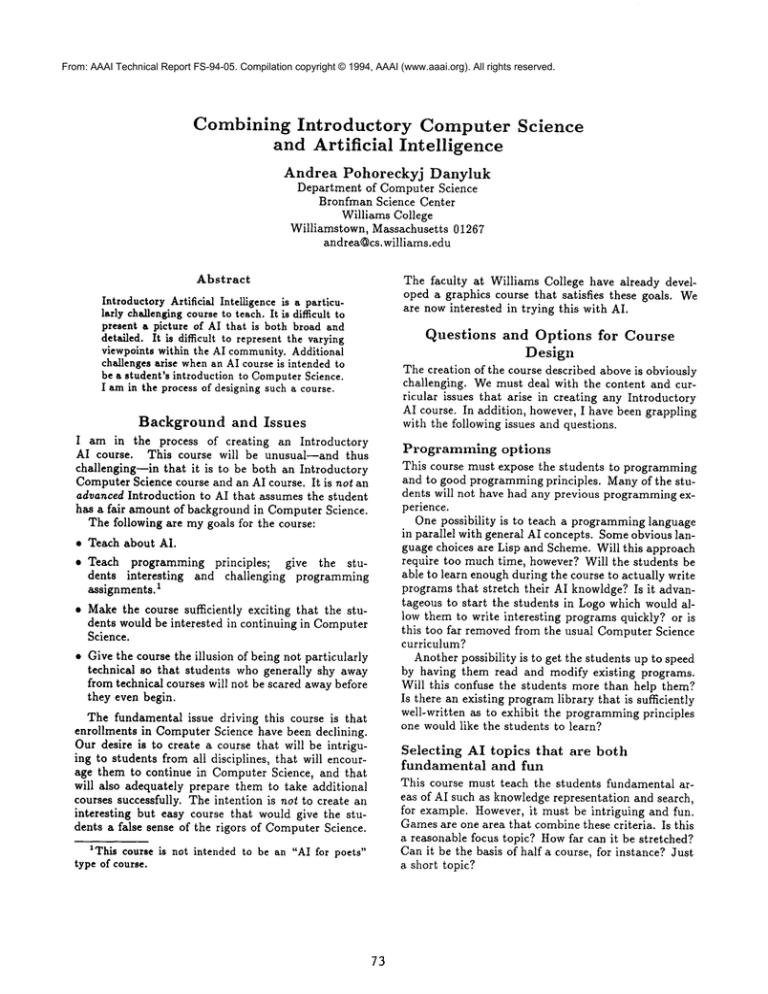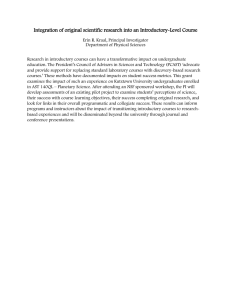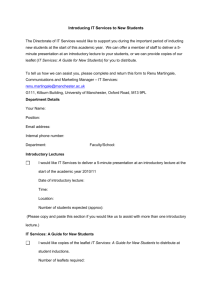
From: AAAI Technical Report FS-94-05. Compilation copyright © 1994, AAAI (www.aaai.org). All rights reserved.
Combining
Introductory
and Artificial
Computer
Intelligence
Andrea Pohoreckyj
Science
Danyluk
Department of Computer Science
Bronfman Science Center
Williams College
Williamstown, Massachusetts 01267
andrea~cs.williams.edu
Abstract
The faculty at Williams College have already developed a graphics course that satisfies these goals. We
are nowinterested in trying this with AI.
IntroductoryArtificial Intelligence is a particularly challengingcourseto teach. It is difficult to
present a picture of AI thatis bothbroadand
detailed.
Itisdifficult
torepresent
thevarying
viewpoints
within
theAI community.
Additional
challenges
arise
whenanAIcourse
isintended
to
bea student’s
introduction
to Computer
Science.
I amintheprocess
ofdesigning
sucha course.
Questions
and Options for Course
Design
The creation of the course described above is obviously
challenging. Wemust deal with the content and curricular issues that arise in creating any Introductory
AI course. In addition, however, I have been grappling
with the following issues and questions.
Background and Issues
I am in the process of creating an Introductory
AI course. This course will be unusual--and thus
challenging--in that it is to be both an Introductory
ComputerScience course and an AI course. It is not an
advanced Introduction to AI that assumes the student
has a fair amount of background in Computer Science.
The following are mygoals for the course:
¯ Teach about AI.
¯ Teach programming principles;
give the students interesting
and challenging programming
1assignments.
¯ Makethe course sufficiently exciting that the students would be interested in continuing in Computer
Science.
¯ Give the course the illusion of being not particularly
technical
so thatstudents
whogenerally
shyaway
fromtechnical
courses
willnothescared
awaybefore
theyevenbegin.
Thefundamental
issuedrivingthiscourseis that
enrollments
in Computer
Science
havebeendeclining.
Ourdesire
is to createa course
thatwillbe intriguingto students
fromalldisciplines,
thatwillencourage themto continue
in ComputerScience,
and that
willalsoadequately
preparethemto takeadditional
courses
successfully.
Theintention
is no$to create
an
interesting
buteasycoursethatwouldgivethestudentsa falsesenseof therigorsof Computer
Science.
IThiscourse
is notintended
to he an "AIforpoets"
typeofcourse.
73
Programming
options
This course must expose the students to programming
and to good programming principles. Manyof the students will not have had any previous programming experience.
One possibility is to teach a programminglanguage
in parallel with general AI concepts. Someobvious language choices are Lisp and Scheme. Will this approach
require too much time, however? Will the students be
able to learn enough during the course to actually write
programs that stretch their AI knowldge? Is it advantageous to start the students in Logo which would allow them to write interesting programs quickly? or is
this too far removed from the usual Computer Science
curriculum?
Another possibility is to get the students up to speed
by having them read and modify existing programs.
Will this confuse the students more than help them?
Is there an existing programlibrary that is sufficiently
well-written as to exhibit the programmingprinciples
one would like the students to learn?
Selecting
AI topics that are both
fundamental
and fun
This course must teach the students fundamental areas of AI such as knowledgerepresentation and search,
for example. However, it must be intriguing and fun.
Gamesare one area that combine these criteria. Is this
a reasonable focus topic? Howfar can it be stretched?
Can it be the basis of half a course, for instance? Just
a short topic?
Are existing programs like ELIZA (Weizenbaum
1966) detrimental in an introductory course such as
this one? On one hand it has the appearance of doing interesting things and can be modified and played
with early in a course. On the other hand, it is not
indicative of "what AI really is" today.
Selecting
readings
Are there any good novels/light reading that one can
assign? In the early days of the course I will be spending a fair amountof time getting the students familiar
with the computingfacilities in the lab. Is there some
reading they can be doing that is not too intensive, yet
not a waste of their time. Ideally I would like to find
something that would be intriguing,
and would also
identify real AI issues.
What type of text book is appropriate for such a
course? Manyrigorous AI texts are geared toward advanced undergraduate and/or early graduate level students. Can these textbooks be used for smart students
in an introductory Computer Science course?
Summary
Introductory Artificial Intelligence is a difficult course
to teach for the manyreasons indicated in the description of this symposium. This becomes even more challenging when the course is to be an Introductory Computer Science course as well, rather than one where
the students have fair Computer Science background.
Our challenge is to create a course that is rigorous,
and we must therefore be concerned with the issues
raised by the symposiumdescription. Yet we must address additional challenges since we cannot assume any
Comptuer Science background and must teach fundamental ComputerScience principles as well as AI.
References
Weizenbaum, J. 1966. ELIZA--A computer program
for the study of natural language communication between man and machine. CA CM9:36-45.
74


